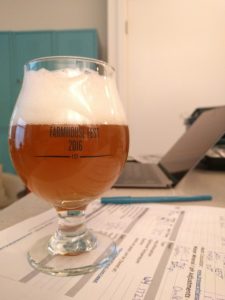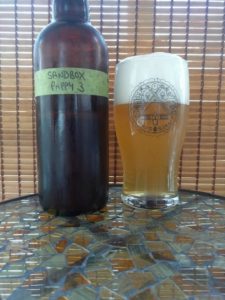Brewed: March 3, 2015 Bottled: March 27, 2016
ABV: 5.5% IBU: 30
Bresse & Byre is intended to be a country (farmhouse) ale that draws inspiration from the style’s more historical roots. As such, the ABV will be modest and there’ll be a fairly assertive bitterness to keep acid-producing bacteria under control. In the spirit of small, resourceful farmhouses its recipe will also utilize a number of fermentables and each batch will be unique.
The heart of this brew was the Wallonian Farmhouse yeast from The Yeast Bay. It’s my first time using it. The recipe was developed to be around 5.5% ABV and 30 IBU. I went with 2-row instead of pilsner as the base malt due to the fact that I was brewing this with only an ice bath chill and a stove-top boil, neither of which are well suited to pilsner malt.
Details:
3.50 lbs Canadian 2-row
0.50 lbs Munich
0.50 lbs Wheat malt
0.25 lbs Flaked wheat
0.15 lbs Dextrose / Corn sugar
0.10 lbs Acidulated malt
It was hopped at 50 minutes with 0.5 oz Strisselspalt and 0.25 oz Tettnang, and then the same quantities were also added at 10 minutes, along with the sugar. Here’s the rest of the details:
1/4 tsp CaCl was added to the mash water
Mash was carried out as an infusion at 152F for 75 minutes
Sparged at 169F, resulted in about 3.7 gallons of 1.043 SG wort
Boiled 75 minutes then chilled to 67F, resulting in an OG of 1.052.
The yeast was pitched at 8:30pm on Thursday, and when I went to work at 7:00am the next morning there was still no activity, which is the longest lag I’ve had yet and it had me a bit concerned. By 11:00am there was plenty of action though, and when I got home that evening it was really churning. By Sunday it had largely flocculated and the haze was starting to settle out.
Tasting Notes:
Apr 14, 2016 – 3 weeks in bottle, medium carbonation. Tastes young but the yeast profile seems promising.
Apr 25, 2016 – Light, citrus and earthy components. Slightly spicy. Tasting pretty good.
Dec 15, 2016 – Gusher bottle. Cherry flavour on the nose which I don’t remember picking up before. Neat aroma, but there are some displeasing esters in the taste that I am not super into.
Dec 29, 2016 – Some bottles have gushed strongly, but this one was only a slow gush. Certainly some additional slow attenuation occurred after bottling as this is carbonated to easily 4-5 volumes now. A unique yeast strain for sure, and as already mentioned it’s not really my bag. Nose is orange zest and herbal notes, while the taste also adds a mineral character and a very dry finish. There is something unwelcome that lingers on as well, though not too strongly.


